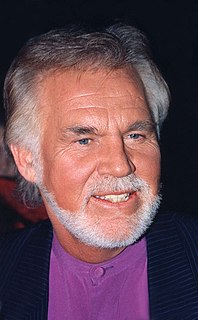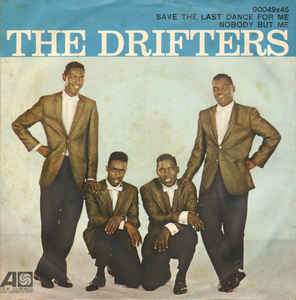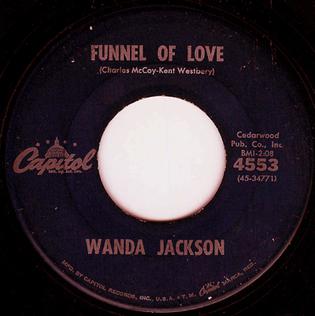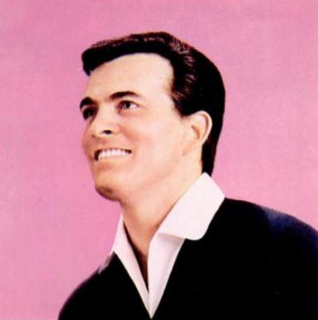Related Research Articles
Rockabilly is one of the earliest styles of rock and roll music. It dates back to the early 1950s in the United States, especially the South. As a genre it blends the sound of Western musical styles such as country with that of rhythm and blues, leading to what is considered "classic" rock and roll. Some have also described it as a blend of bluegrass with rock and roll. The term "rockabilly" itself is a portmanteau of "rock" and "hillbilly", the latter a reference to the country music that contributed strongly to the style. Other important influences on rockabilly include western swing, boogie-woogie, jump blues, and electric blues.

Kenneth Ray Rogers was an American singer, songwriter, musician, actor, record producer, and entrepreneur. He was elected to the Country Music Hall of Fame in 2013. Rogers was particularly popular with country audiences but also charted more than 120 hit singles across various music genres, topping the country and pop album charts for more than 200 individual weeks in the United States alone. He sold more than 100 million records worldwide during his lifetime, making him one of the best-selling music artists of all time. His fame and career spanned multiple genres: jazz, folk, pop, rock, and country. He remade his career and was one of the most successful cross-over artists of all time.

Ronnie Lee Milsap is an American country music singer and pianist. He was one of country music's most popular and influential performers of the 1970s and 1980s. He became one of the most successful and versatile country "crossover" singers of his time, appealing to both country and pop music markets with hit songs that incorporated pop, R&B, and rock and roll elements. His biggest crossover hits include "It Was Almost Like a Song", "Smoky Mountain Rain", "(There's) No Gettin' Over Me", "I Wouldn't Have Missed It for the World", "Any Day Now", and "Stranger in My House". He is credited with six Grammy Awards and thirty-five No. 1 country hits, third to George Strait and Conway Twitty. He was selected for induction into the Country Music Hall of Fame in 2014.

Wanda Lavonne Jackson is a retired American singer, songwriter, pianist and guitarist who had success in the mid-1950s and 1960s as one of the first popular female rockabilly singers, and a pioneering rock-and-roll artist. She is known to many as the "Queen of Rockabilly" or the "First Lady of Rockabilly".

Keith Lionel Urban is an Australian singer, songwriter, and record producer. In 1991, he released a self-titled debut album, charting four singles in Australia before moving to the United States the following year. He found work as a session guitarist before starting a band known as The Ranch, which recorded one studio album on Capitol Nashville and charted two singles on the US Billboard Hot Country Songs chart.

William Harold Dean Jr. is an American country music singer and songwriter.

"Save the Last Dance for Me" is a song written by Doc Pomus and Mort Shuman, first recorded in 1960 by the Drifters, with Ben E. King on lead vocals.
"A Little Bitty Tear" is a song written by the American country songwriter Hank Cochran. It has been recorded by many musical acts, the first being American recording artist Burl Ives. It has since been recorded by others, including Wanda Jackson, Bing Crosby, Chet Atkins, and Cochran himself.

"At This Moment" is a song written by Billy Vera and recorded live by Vera and his band under the name, Billy & the Beaters, in 1981, during a string of performances at the Roxy in West Hollywood and featured on their self-titled live album, Billy and the Beaters, released that year on the American subsidiary of Japan's Alfa Records. The song is more notable for its second run on the charts years after its initial release, following a featuring on an episode of Family Ties, during which the song became a #1 hit.
"Let's Have a Party" is a 1957 song written by Jessie Mae Robinson and recorded by Elvis Presley for the movie Loving You. It was released as a single in the United Kingdom under the title "Party" and peaked at #2 in the UK Singles Chart. Wanda Jackson recorded the song for her first album, Wanda Jackson, released in 1958. The song was released as a single by Jackson in 1960 and entered the UK chart on 1 September of that year, spending eight weeks there and reaching #32; it also reached #37 on the Billboard Hot 100 in 1960. The Jackson version was later featured in the 1989 film Dead Poets Society. Paul McCartney also recorded and released the song on his 1999 Run Devil Run album. His original song "Run Devil Run", on the album of the same name, also has a similar melody. A cover of "Let's Have a Party" by Sonia was included on the 2010 remastered edition of her 1989 album Everybody Knows.

"Funnel of Love" is a song by Wanda Jackson written by Charlie McCoy and Kent Westbury. Recorded in 1960 and released in 1961, "Funnel of Love" was released as the B-side to Jackson's major country-pop single, "Right or Wrong". Although the song never became a hit independently from the A-side, it has received notable critical acclaim and attention. The song's unique combination of country, rock, and blues have made it a favorite of fans and critics. Many also consider "Funnel of Love" to be one of Jackson's best vocal performances.

Ronald Eugene Dove is an American pop and country musician who had a string of hit pop records in the mid to late 1960s and several country chart records in the 1970s and 1980s.

Dan Easton Corbin is an American country music singer. He signed to Mercury Records Nashville in 2009 and released his self-titled debut album in March 2010, featuring the two number-one hits "A Little More Country Than That" and "Roll with It", as well as the number-14 hit "I Can't Love You Back". His second album, All Over the Road, was released in September 2012. Its first single, "Lovin' You Is Fun", was released in February 2012. The album's second single, "All Over the Road", was released in January 2013. As of 2013, he had sold over 470,000 albums and over 2 million singles. His song "Are You with Me" became an international hit in a remix version released by the Belgian DJ and record producer Lost Frequencies.

My Second Album is the second studio album released by American country artist Donna Fargo. The album was released in February 1973 on Dot Records and was produced by Fargo's husband and manager Stan Silver. The album spawned two number one singles on the Billboard country chart and was one of two albums Donna Fargo would release in 1973.

The singles discography of Wanda Jackson, an American recording artist, consists of seventy-eight singles, nine international singles, one charting b-side, and three music videos. In 1954 at age sixteen, she signed as a country artist with Decca Records. Her debut single was a duet recording with Billy Gray which reached the eighth spot on the Billboard Hot Country Singles chart, also in 1954. Refusing to tour until completing high school, Jackson's further singles for Decca failed gaining success. She signed with Capitol Records in 1956 and began incorporating rock and roll into her musical style. Jackson's first Capitol single exemplified this format and became a national top-twenty country hit. Follow-up rock singles between 1957 and 1959 failed gaining enough attention to become hits including, "Hot Dog! That Made Him Mad", "Fujiyama Mama", and "Honey Bop". In 1960 however, the rock and roll-themed, "Let's Have a Party", became Jackson's first Billboard top-forty pop hit after it was picked up by an Iowa disc jockey.

The albums discography of Wanda Jackson, an American recording artist, consists of forty-five studio albums, one international studio album, seven tribute and cover albums, four live albums, twenty-one compilation albums, and two box sets. In 1954 at age sixteen, Jackson signed with Decca Records as a country music artist. The label did not issue a record until the 1962 compilation Lovin' Country Style, six years after Jackson left Decca. She signed with Capitol Records in 1956, and her self-titled debut studio album was released three years later. Although Jackson had recently been identifying herself as a rock-and-roll performer, the album consisted of country music recordings. However, it did contain Jackson's future rock-and-roll hit "Let's Have a Party", which was a hit in 1960, reaching the Top 40 on the Billboard Pop chart. The success of her rock-and-roll recordings led to the release of two more rock-and-roll studio LPs: Rockin' with Wanda (1960) and There's a Party Goin' On (1961). Additionally, Capitol issued two "split" studio albums which contained rock and roll on one side and country music on the other.
"Right or Wrong" or "Right or Wrong " is a song written and originally recorded by Wanda Jackson, an American country, rock, and Christian music artist. Originally, the song was a major country and pop hit for Jackson in 1961. A second version was released in 1964 that became popular by American pop artist, Ronnie Dove.
"In the Middle of a Heartache"' is a song written by Laurie Christenson, Pat Franzese, and Wanda Jackson. The song was recorded by Wanda Jackson, an American country, rock, and Christian artist.
"The Box It Came In" is a song written by Vic McAlpin (1918-1980) that was recorded by American country, rock, and Christian artist, Wanda Jackson.
"My Big Iron Skillet" is a song written by Bryan Creswell and Wilda Creswell. It was recorded and released as a single by American country, rock, and Christian artist, Wanda Jackson.
References
- ↑ "Country Music Discographies: Wanda Jackson, Part One". Praguefrank's Country Music Discographies. Retrieved December 17, 2013.
- ↑ "Wanda Jackson Biography". The Rock and Roll Hall of Fame . Retrieved December 17, 2013.
- ↑ Whitburn, Joel (2004). The Billboard Book of Top 40 Country Hits: 1944–2006, Second edition. Record Research.